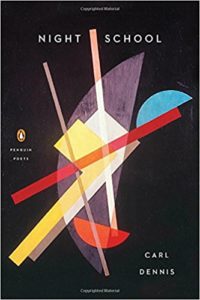Night School

Night School,
by Carl Dennis.
Penguin Books, 2018, 112 pages,
paperback, $20,
ISBN: 0143132350
When I learned the title of Carl Dennis’s new book is Night School,I was concerned his voice might have become darker than in recent works such as Callings, Unknown Friends,and Another Reason. When interviewing him for an earlier Café Review issue, I mentioned that certain older poets wrote sadder poems. He said he “would distrust an older poet whose work isn’t gloomy now and then.” Loss, he said, is a constant in our existence, and there’s so much to lose.
One of the most moving poems in Night Schoolis “Wallace Siner.” The title refers to a soldier killed in Vietnam whose name Dennis was once charged with saying aloud at a protest outside the White House. Siner, he later learned, died at age thirty, leaving behind a wife and two sons. Dennis wonders how it’s possible to have forgotten so many names, yet he’s grateful to remember the name Wallace Siner:
Fifty years ago, I shouted it as a challenge.
Now, as I wonder how much of whoever I was
Still lives, I say it quietly to myself.
While Dennis cautioned me against too easily interpreting his poems as an “affirmation of life,” I’m not able to see him as a poet of despair. Repeatedly I find kindness in his poems, and those in Night Schoolare no exception. In “A Typescript” he sits in the office of “the only editor willing to give me an interview,” as he tries to find a publisher for a book about how to end war forever, written by a deceased friend who’d spent the last ten years of his life on it. In “Nothing,” he speaks amiably of a newly-arrived stranger in town:
…who’s delighted, after finding no room
At the inn for the likes of him, to find behind it
A field just right for resting.
In “A Friend and a Book” we meet his “great-hearted friend Louisa who does all she can” for others. She is one on whose kindness strangers can depend, which is why she’s always late for coffee.
In several poems over the years, Dennis has expressed reservations about his own capacity for altruism, yet as an avid reader of his work, I regularly encounter a voice consistently free of mean-spiritedness. His Whitman-like egalitarianism enables him to write a poem like “Joseph’s Work,” about a man who has spent decades “Overseeing the produce at the market/His brothers own.” His compassionate portrayal reminds me of several poems from his book Callings,with titles such as “A Roofer,” An English Teacher,” “A Motel Keeper.”
Part IV, the final section of Night School,has something of an Americana theme, with poems titled “Finding Thoreau,” “At Emily Dickenson’s House,” and “To Whitman.” There’s also a poem called “Mrs. Gottlieb’s Course in World Literature,” which I would call a tribute to English majors (at least those of pre-Deconstruction eras). Mrs. Gottlieb tells her students that great literature awaits and has the potential to guide them when other advice seems lacking:
So many questions to be raised and answered,
So many big decisions easy to miss
When they come disguised as small ones.
These lines I see as key to reading Carl Dennis’s poetry, which is similar to Thornton Wilder’s Our Town,a play that’s been a staple of high school theater because, at first, it may seem ordinary and traditional. However, the acclaimed production directed by David Cromer a few years ago was lauded for plumbing the depths others had missed. A cursory reading of Dennis’s work might mean missing not only the depth but, most notably, as at least one other reviewer has observed, the wisdom.
The last poem in Night School is a great example. A man recalls how his father taught him not to be afraid of the dark, having him walk at night a certain distance from the porch, where his father waits, and stop when the fear is too much. Gradually the boy extends his quest from the toolshed to the far edge of the property.
I can call the story a votive candle
The son lights to his father’s memory.
And now that the son is some twenty years
Older than his father was when he died,
I can call it another rehearsal for the night
When his own soul is compelled to leave his body
Behind forever and wander on a road
He doesn’t recognize.
There is more than one votive candle among the poems in Night School.
—Kevin Sweeney

